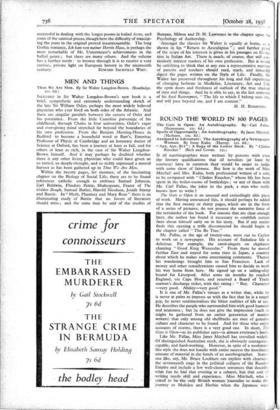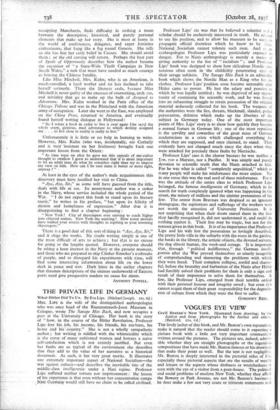ROUND THE WORLD IN 300 .PAGES
Spoils of Opportunity : An Autobiography. By Janet Mitchell. (Methuen. to& 6d.) Assigned to Adventure : The Autobiography of a Newspaper Woman. By Irene Kuhn. (Harrap. los. 6d.) " Aye, Aye, Sir" : A Saga of the Lower Deck. By " Clinker Knocker." (Rich and Cowan. 15s.) IF all autobiographies were written'. by persons with even the literary qualifications that all novelists (at least by courtesy) hive in common they would be easier to judge with some show of fairness. But how is the work of Miss
Mitchell and Mrs. Kuhn, both professional writers of a sort, to be compared with "-Clinker Knocker," whose life has been spent in the boiler-rooms of battleships ; or any of them with Mr. Carl Fallas, the joker in the pack, a man who really knows how to write ?
The Gate is Open is an unusual and exceedingly able piece of work. Having announced this, it should perhaps be added that the first twenty or thirty pages, which are in the form of a series of pictures, do not possess the narrative force of the remainder of the book. For reasons that are clear enough later, the author has found it necessary to establish certain facts about himself early on in his story. But if any reader finds this opening a trifle disconnected he should begin at the chapter called " The Bo Tree."
Mr. Fallas, at the age of twenty-one, went out to Ceylon to work on a newspaper. His account of Sinhalese life is delicious. For example, the carol-singers on elephants chanting " Good King Wenceslas." From there he moved further East and stayed for some time in Japan, a country about which he makes some entertaining comments. Thence his wanderings brought him to San Francisco. Lack of money and other Considerations caused him to decide to work his way home from here. - He signed up on a sailing-ship bound for Liverpool. After some six months he reached England, via Cape Horn, and received a Board of Trade seaman's discharge ticket, with this rating : " Boy. Character —very good. Ability—very good."
It is one of Mr. Fallas's virtues as a writer that, while he is never at pains to impress us with the fact that he is a tough guy, he never sentimentalises the bitter realities of life at sea. He describes the people who surrounded him with good humour and acuteness ; but he does not give the impression (such as might be gathered from an earlier generation of marine writers) that only among old shellbacks are men of genuine culture and character to be found. And for those who enjoy accounts of storms, there is a very good one. In short, The Gate is Open—as its publisher says—is almost everyone's book.
Like Mr. Fallas, Miss Janet Mitchell has travelled widely. Of distinguished Australian stock, she is obviously courageous, capable, and hard-working. However, in spite of a workman- like style she does not handle with entire success the inordinate amount of material in the hands of an autobiographer. Some- one like, say, Mr. Bruce-Lockhart can explain with clearnes, the seventeenth stage in the political collapse of the Russian Empire and include a few well-chosen sentences that describe what fun he had that evening at a cabaret, but that sort cf writing needs skill and experience. Miss Mitchell, who is stated to be the only British woman journalist -to-make the journey to Mukden and Harbin when the Japanese were
occupying Manchuria, finds difficulty in striking a mean
between the descriptive; historical, and purely personal elements that make up her story. She is most at home in the world of conferences, delegates, and eager feminine enthusiasms, that hang like a fog round Geneva. She tells us she has lost her early belief in Causes. She should avoid them ; or the old craving will return. Perhaps the best part of Spoils of Opportunity describes how the author became
the organiser of " a State-Wide Thrift Campaign in New South Wales,", a task that must have needed as much courage as braving the Chinese bandits. . •
Like Miss Mitchell, Mrs. Kuhn, who is an American, is much-travelled, a hard worker and no less inclined to take herself seriously. There the likeness ends, because Miss Mitchell is never guilty of the excesses of overwriting, arch -less, and triviality that go to make up the bulk of Assigned to Adventure. Mrs. Kuhn worked in the Paris office of the Chicago Tribune and was in the Rhineland with the American army of occupation. Later she went ,to the East, was employed on the China Press, returned to America, and eventually
found herself writing dialogue in Hollywood :
" So I wrote a book in order to live it over again [she says] the whole crazy, glorious, mad adventure to which destiny assigned me . . . to live close to reality is really to live."
Unfortunately it is little or no help in learning to write.
However, Mrs. Kuhn (who was, incidentally, née Corbally and is very 'insistent on her Irishness) brought back one
important lesson from the Orient : " As time went on after he gave me this capsule of masculine though( to swallow I grew so understand that iris. more important to let an adult ;tnan do what he considers right than try to impose my view on him. How can I be sure mine is better or more right, anyway ?."
At least in the eyes of the author's male acquaintances this discovery must have justified her visit to China.
"Aye, Aye, Sir," as some will have guessed from the title, deals with life at sea. Its anonymous author was a stoker in the. Navy, whose service included the whole period of the War. " I do not expect this book to stand upon its literary merit," he writes in his preface, " but upon its felicity of diction and homeliness of expression." After that it is disappointing to find a chapter beginning : " New York ! City of skyscrapers ever, striving to reach higher into ethereal realms. New York the aspiring ! How many mortals have walked your streets with thoughts as aspiring as your towering skyscrapers."
There is a good deal of this sort of thing in "Aye, Aye, Sir,"
and it clogs the works. No doubt writing simply is one of the most difficult of arts to achieve ; but that is no 'excuse
for going to the lengths quoted. However, everyone should be taking a keen interest in the Navy at the present moment, and those who are prepared to skip Clinker Knocker's outbreaks of purple, and to disregard his experiments with time, will find some interesting information about life on the lower deck in peace and war. Dark- hints in the' earlier chapters that threaten deicriptions of the sinister underworld of Eastern ports need give prospective readers no cause for alarm.
ArrnioNz Pown.L.

























































 Previous page
Previous page